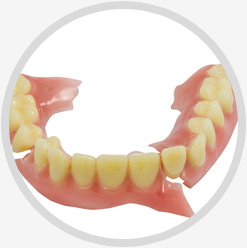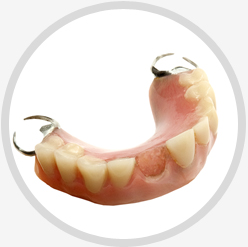
Denture wearers have often been severely inconvenienced by situations where broken dentures occur. The broken dentures result in patients having major problems with eating and speaking, which often results in major social embarrassment. While not a life-threatening dental emergency, the denture wearer most likely wants the broken denture fixed immediately.

Repairing broken dentures can be accomplished with varying degrees of difficulty depending on the severity of the breakage. Cracked dentures where a clean break has occurred can be bonded back together in approximately one hour. A denture tooth that has come out can also be bonded back into place. Denture repair acrylic is used in these situations. However, if the broken denture is in several pieces, or if some pieces of the broken denture are missing, then the broken denture repair becomes substantially more difficult, if not impossible, and a new denture may be required. Many simple denture repairs can be performed at the dental office while other complicated repairs of broken dentures must be sent to a dental laboratory.
It is best to visit a dentist or denturist for any assessment of the breakage. However, while there are denture repair kits, the success from the patient using these kits is limited and often makes further repairs difficult. It is very difficult for most patients to approximate the edges of the broken denture back to how they might have been originally in order to fit it back properly.

Essentially, it is always better and more reliable and predictable to have a broken denture professionally repaired than for the broken denture wearer to attempt the repair themselves. Our emergency dental office performs simple denture repairs involving acrylic fracture only and no repairs involving metal framework or wrought wire clasp or repairs involving locators for implant supported broken dentures. For broken denture repairs that we cannot perform, referrals are given to denturists or other specialists such as prosthodontists. Over the counter denture repair kits generally do not produce the same quality result as a professional repair and such repair kits are not usually available in Canada although some individuals in Canada have acquired them from the USA or elsewhere where over the counter denture kits are readily available.
Situations where denture breakage occurs can be distressing and disconcerting, especially if the breakage occurs in a social setting. Repair of the broken denture should be performed as soon as possible to restore masticatory function and for aesthetics. Soft tissue injury can occur, even resulting in a soft tissue infection if the broken denture usage is prolonged. Furthermore other pathology may also arise with chronic irritation being associated with the increased risk of malignancies.
Broken dentures are often repaired with autopolymerizing monomer and polymer and autopolymerizing monomer and heat cured polymers. The strength of the repair of the broken denture is increased with 45 degree bevels joint designs over designs with butt margins. The strength of the broken denture repair using a hydro flask or pressure pot with or without hot water were greater than for broken denture repairs performed with bench curing alone. There was no difference in the strength of repairs performed with autopolymerizing monomer and heat cured polymer.
Recurrent breaking of dentures is highly frustrating to the patient, dental laboratory and dentist alike. Research on the successful repair of broken dentures includes repair design, different repair material, correct colour match with the existing gingiva or gum and existing broken denture and surface of the broken denture treatment to facilitate bonding or adherence of the repair material. The bond strength of the repair material to the broken denture base is the most important factor in the success of repairing a broken denture. New nano-technology has been developed to improve the repair properties. Zirconia- nanoparticles (nano-Zr02) have been suggested for the incorporation into the PMMA denture base because of superior mechanical surface and biological properties as well as their biocompatibility.

Broken dentures fracture most commonly due to flexural change or impact. Flexural fatigue results from repeated flexing of the denture material similar to cyclic fatigue whereas impact failure or catastrophic failure demonstrates the mechanical limitation of the denture material.
Prevalence of broken or debonded denture teeth seems to be significantly higher for the maxillary or upper denture than for the mandibular or lower denture.
Currently, at the end of 2022, the Canadian Government has passed
Bill C-31 to provide coverage for all Canadians of lower-income.
The details of the plan have not been released so it is unknown if
dentures, the repair of broken dentures, what type of dentures and the frequency at which Canadians can get new dentures will be addressed by this new plan. Whether broken dentures made before this plan came into effect be eligible for repair is also unknown.